|
|
|
Sort Order |
|
|
|
Items / Page
|
|
|
|
|
|
|
| Srl | Item |
| 1 |
ID:
115207
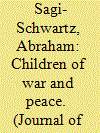

|
|
|
|
|
| Publication |
2012.
|
| Summary/Abstract |
Political conflicts and intractable wars can be conceived as disasters of human activities and they affect the entire life of children and their families. An ecological-transactional perspective of human development is adopted in order to identify multilevel developmental and contextual trajectories that might facilitate or impede the willingness and readiness of people to engage openly and flexibly in conflict-resolution paradigms. It is proposed that building early trustful relationships at the interpersonal level is likely to enhance one's willingness and ability to explore the other side's goals in the conflict, and ultimately to consider reconciliation. At the same time, the absence of such trustful relationships is likely to induce more rigid and one-sided approaches in adulthood. Toward that end, the Palestinian-Israeli conflict serves as the main context of analysis.
|
|
|
|
|
|
|
|
|
|
|
|
|
|
|
|
| 2 |
ID:
115202
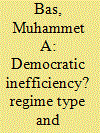

|
|
|
|
|
| Publication |
2012.
|
| Summary/Abstract |
This article examines the relationship between regime type and decision makers' tendency to make suboptimal choices in international crises. To test hypotheses on the optimality of democratic foreign policy, the author uses a novel statistical measure of suboptimality in foreign policy behavior. This estimator builds on Signorino's statistical strategic models to allow for actor-level variation in deviations from optimal behavior in a strategic setting. An analysis of the international disputes from 1919 to 1999 shows that democratic leaders have a greater tendency to choose policies not optimal for their citizens than do nondemocratic leaders.
|
|
|
|
|
|
|
|
|
|
|
|
|
|
|
|
| 3 |
ID:
115204


|
|
|
|
|
| Publication |
2012.
|
| Summary/Abstract |
Bilateral trade agreements have proliferated rapidly within the last two decades, growing into a dense network of multiple ties between countries. The spread of preferential trade agreements (PTAs), however, is not uniform: some countries have signed a multitude of deals, while others remain much less involved. This article presents a longitudinal network analysis method to analyze the patterns of the formation of trade agreements, based on the mutual codetermination of network structure and agreement formation. The findings suggest that PTAs spread endogenously because of structural arbitrage effects in the network, and that they establish a hierarchy among countries. Rich countries form ties with each other and middle-income countries, who themselves create a horizontal layer of PTAs, but least-developed countries are left behind and do not form many ties. Supplanting the multilateral trade regime with preferential agreements therefore creates a system of highly asymmetrical relationships of weaker spokes around a few hubs.
|
|
|
|
|
|
|
|
|
|
|
|
|
|
|
|
| 4 |
ID:
115201
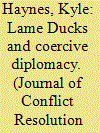

|
|
|
|
|
| Publication |
2012.
|
| Summary/Abstract |
The literature on "audience costs" in International Relations suggests that a democratic leader's electoral accountability lends him or her a significant advantage in crisis-bargaining situations. But if elections are the primary source of a democratic leader's accountability, a democracy's advantage in crisis situations should disappear when its leader is no longer eligible for reelection. Accordingly, this article asks whether "lame-duck" presidents, those who are constitutionally prohibited from reelection, are systematically less effective than their reelectable counterparts in crisis-bargaining situations. Using a data set of all post-World War II militarized interstate disputes initiated by presidential democracies, the author tests several hypotheses regarding lame-duck crisis behavior derived from Fearon's bargaining model. The findings generally support the audience costs model. Observed patterns of threat reciprocation and crisis hostility are consistent with Fearon's predictions. Crisis outcomes, however, do not appear to be affected by a democratic leader's lame-duck status.
|
|
|
|
|
|
|
|
|
|
|
|
|
|
|
|
| 5 |
ID:
115206
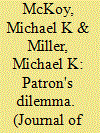

|
|
|
|
|
| Publication |
2012.
|
| Summary/Abstract |
We analyze an understudied mode of democratization in which the acquiescence of an autocratic regime's foreign ally, or patron, is pivotal to the success of a democratic movement. Although a democratic patron may prefer having democracy in its dependent allies, regime change threatens the economic and security benefits associated with the alliance. We formalize this dilemma through a repeated principal-agent model and demonstrate that the critical dimension is the patron's beliefs about the potential democracy's policies rather than its value for democracy or the alliance goods. Patron support hinges on democratic movement signaling of its capacity to rule, popular support, and commitment to preserving the alliance. To test our theory, we analyze twenty-five democratic openings in American cold war clients, followed by case studies of US-aided democratization episodes in the Philippines and South Korea. We conclude with an analysis of the recent Egyptian revolution.
|
|
|
|
|
|
|
|
|
|
|
|
|
|
|
|
| 6 |
ID:
115205
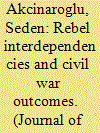

|
|
|
|
|
| Publication |
2012.
|
| Summary/Abstract |
The article investigates how rebel interdependencies shape civil war outcomes. The author argues that alliances between rebel groups will have serious repercussions on the management of conflict. By examining civil war outcomes between 1946 and 2008, the author shows that the presence of multiple groups, alliances among rebels, the cumulative capabilities of one's allies as well as the credibility and the durability of alliances shape war outcomes. Rebels have the means to avoid government defeat and continue conflict when the number of rebel groups the government has to confront simultaneously is high or when these groups cooperate against their common enemy. Findings show that while termination by peace agreement is unlikely for allied rebels, specifically for those that have enduring relationships, rebels with access to high levels of ally capabilities along with those who have credible alliance ties are likely to be the victors of war.
|
|
|
|
|
|
|
|
|
|
|
|
|
|
|
|
| 7 |
ID:
115203


|
|
|
|
|
| Publication |
2012.
|
| Summary/Abstract |
Many scholars assume that nationalism is inherently aggressive without systematically exploring the relationship between nationalism and interstate war initiation. Thus, many questions are unanswered. Does nationalism increase the risk of war and if so, how? Which types of nationalism are most likely to trigger warfare? The author argues that nationalist persuasion campaigns produce several mechanisms that encourage conflict. Nationalism provokes "national enemies" and their foreign allies, generates biased strategic assumptions, creates domestic interest groups that favor war, permits the suppression of opposition groups, and promotes "nationalist bidding wars." When these processes exist, nationalism should increase the probability of war initiation. But, different forms of nationalism may not have similar effects. Using original data on the existence and type of state-level nationalism from 1816 to 1997, the author finds that nationalism significantly increases the probability of interstate war initiation. However, not all forms of nationalism are created equal in this regard.
|
|
|
|
|
|
|
|
|
|
|
|
|
|
|
|
|
|
|
|
|